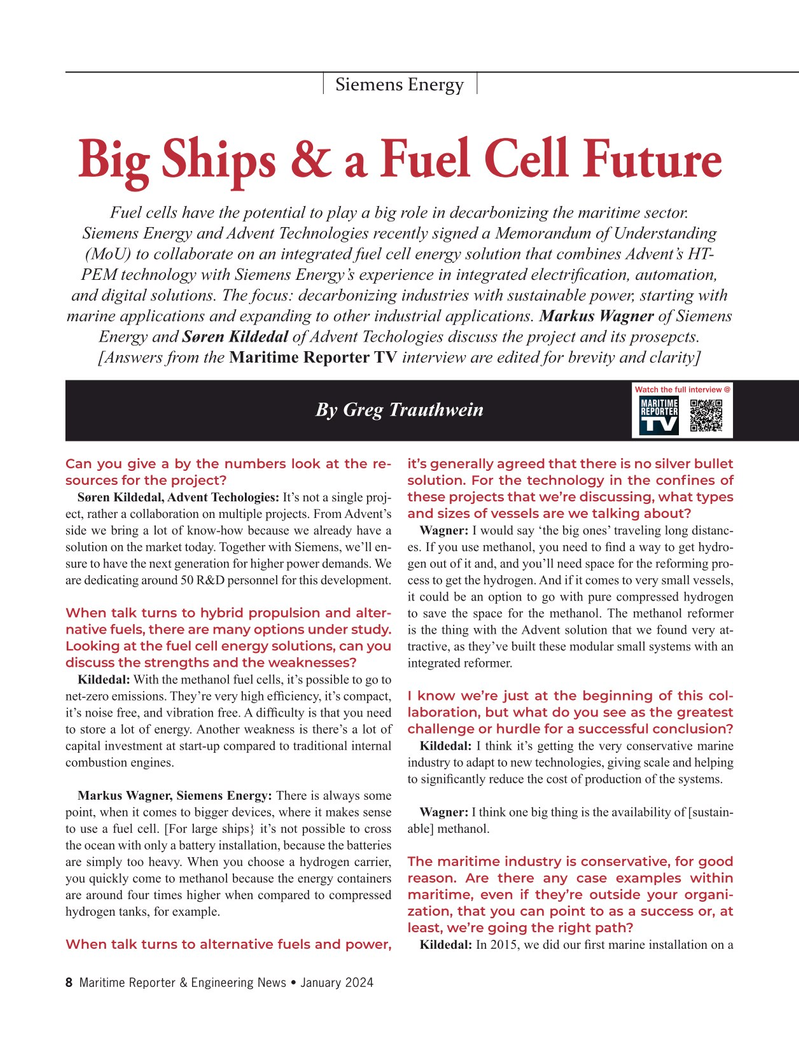
Page 8: of Maritime Reporter Magazine (January 2024)
Read this page in Pdf, Flash or Html5 edition of January 2024 Maritime Reporter Magazine
Siemens Energy
Big Ships & a Fuel Cell Future
Fuel cells have the potential to play a big role in decarbonizing the maritime sector.
Siemens Energy and Advent Technologies recently signed a Memorandum of Understanding (MoU) to collaborate on an integrated fuel cell energy solution that combines Advent’s HT-
PEM technology with Siemens Energy’s experience in integrated electrifcation, automation, and digital solutions. The focus: decarbonizing industries with sustainable power, starting with marine applications and expanding to other industrial applications. Markus Wagner of Siemens
Energy and Søren Kildedal of Advent Techologies discuss the project and its prosepcts.
[Answers from the Maritime Reporter TV interview are edited for brevity and clarity]
Watch the full interview @
By Greg Trauthwein
Can you give a by the numbers look at the re- it’s generally agreed that there is no silver bullet sources for the project? solution. For the technology in the confnes of
Søren Kildedal, Advent Techologies: It’s not a single proj- these projects that we’re discussing, what types ect, rather a collaboration on multiple projects. From Advent’s and sizes of vessels are we talking about? side we bring a lot of know-how because we already have a Wagner: I would say ‘the big ones’ traveling long distanc- solution on the market today. Together with Siemens, we’ll en- es. If you use methanol, you need to fnd a way to get hydro- sure to have the next generation for higher power demands. We gen out of it and, and you’ll need space for the reforming pro- are dedicating around 50 R&D personnel for this development. cess to get the hydrogen. And if it comes to very small vessels, it could be an option to go with pure compressed hydrogen
When talk turns to hybrid propulsion and alter- to save the space for the methanol. The methanol reformer native fuels, there are many options under study. is the thing with the Advent solution that we found very at-
Looking at the fuel cell energy solutions, can you tractive, as they’ve built these modular small systems with an discuss the strengths and the weaknesses? integrated reformer.
Kildedal: With the methanol fuel cells, it’s possible to go to net-zero emissions. They’re very high effciency, it’s compact, I know we’re just at the beginning of this col- it’s noise free, and vibration free. A diffculty is that you need laboration, but what do you see as the greatest to store a lot of energy. Another weakness is there’s a lot of challenge or hurdle for a successful conclusion?
capital investment at start-up compared to traditional internal Kildedal: I think it’s getting the very conservative marine combustion engines. industry to adapt to new technologies, giving scale and helping to signifcantly reduce the cost of production of the systems.
Markus Wagner, Siemens Energy: There is always some point, when it comes to bigger devices, where it makes sense Wagner: I think one big thing is the availability of [sustain- to use a fuel cell. [For large ships} it’s not possible to cross able] methanol. the ocean with only a battery installation, because the batteries are simply too heavy. When you choose a hydrogen carrier, The maritime industry is conservative, for good you quickly come to methanol because the energy containers reason. Are there any case examples within are around four times higher when compared to compressed maritime, even if they’re outside your organi- hydrogen tanks, for example. zation, that you can point to as a success or, at least, we’re going the right path?
When talk turns to alternative fuels and power, Kildedal: In 2015, we did our frst marine installation on a 8 Maritime Reporter & Engineering News • January 2024

 7
7

 9
9
